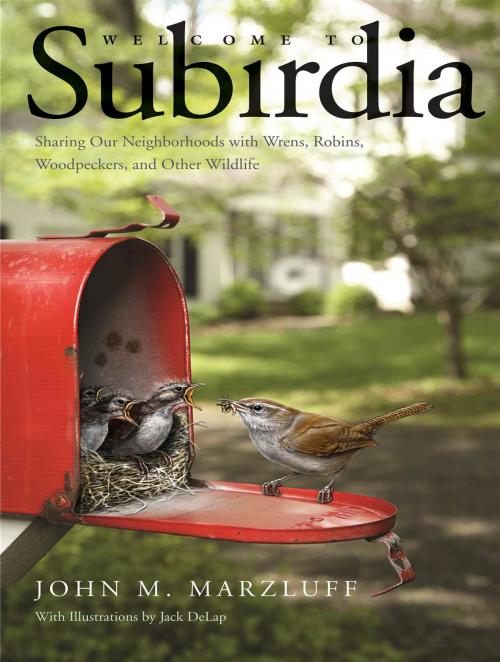Welcome to Subirdia
Sharing Our Neighborhoods with Wrens, Robins, Woodpeckers, and Other Wildlife
Nonfiction, Science & Nature, Nature, Environment, Ecology, Science, Biological Sciences, Zoology, Animals| Author: | John M. Marzluff | ISBN: | 9780300210309 |
| Publisher: | Yale University Press | Publication: | September 30, 2014 |
| Imprint: | Yale University Press | Language: | English |
| Author: | John M. Marzluff |
| ISBN: | 9780300210309 |
| Publisher: | Yale University Press |
| Publication: | September 30, 2014 |
| Imprint: | Yale University Press |
| Language: | English |
Welcome to Subirdia presents a surprising discovery: the suburbs of many large cities support incredible biological diversity. Populations and communities of a great variety of birds, as well as other creatures, are adapting to the conditions of our increasingly developed world. In this fascinating and optimistic book, John Marzluff reveals how our own actions affect the birds and animals that live in our cities and towns, and he provides ten specific strategies everyone can use to make human environments friendlier for our natural neighbors.
Over many years of research and fieldwork, Marzluff and student assistants have closely followed the lives of thousands of tagged birds seeking food, mates, and shelter in cities and surrounding areas. From tiny Pacific wrens to grand pileated woodpeckers, diverse species now compatibly share human surroundings. By practicing careful stewardship with the biological riches in our cities and towns, Marzluff explains, we can foster a new relationship between humans and other living creatures-one that honors and enhances our mutual destiny.
Over many years of research and fieldwork, Marzluff and student assistants have closely followed the lives of thousands of tagged birds seeking food, mates, and shelter in cities and surrounding areas. From tiny Pacific wrens to grand pileated woodpeckers, diverse species now compatibly share human surroundings. By practicing careful stewardship with the biological riches in our cities and towns, Marzluff explains, we can foster a new relationship between humans and other living creatures-one that honors and enhances our mutual destiny.
Welcome to Subirdia presents a surprising discovery: the suburbs of many large cities support incredible biological diversity. Populations and communities of a great variety of birds, as well as other creatures, are adapting to the conditions of our increasingly developed world. In this fascinating and optimistic book, John Marzluff reveals how our own actions affect the birds and animals that live in our cities and towns, and he provides ten specific strategies everyone can use to make human environments friendlier for our natural neighbors.
Over many years of research and fieldwork, Marzluff and student assistants have closely followed the lives of thousands of tagged birds seeking food, mates, and shelter in cities and surrounding areas. From tiny Pacific wrens to grand pileated woodpeckers, diverse species now compatibly share human surroundings. By practicing careful stewardship with the biological riches in our cities and towns, Marzluff explains, we can foster a new relationship between humans and other living creatures-one that honors and enhances our mutual destiny.
Over many years of research and fieldwork, Marzluff and student assistants have closely followed the lives of thousands of tagged birds seeking food, mates, and shelter in cities and surrounding areas. From tiny Pacific wrens to grand pileated woodpeckers, diverse species now compatibly share human surroundings. By practicing careful stewardship with the biological riches in our cities and towns, Marzluff explains, we can foster a new relationship between humans and other living creatures-one that honors and enhances our mutual destiny.















